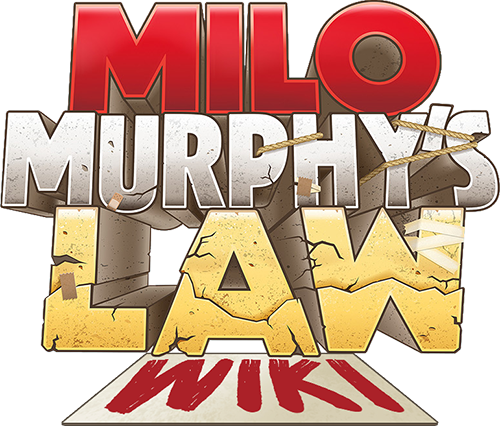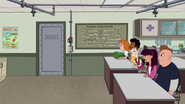Tag: Visual edit |
No edit summary |
||
| Line 24: | Line 24: | ||
== Gallery == |
== Gallery == |
||
<gallery position="center" spacing="small"> |
<gallery position="center" spacing="small"> |
||
| − | Fungus (55).png |
+ | Fungus (55).png|Melissa's mind is blown. |
| + | Hey There.PNG|Phineas agrees it's been a long time. |
||
| − | JamesKim.png |
||
| + | JamesKim.png|James Kim's cameo. |
||
| + | Mid-Afternoon Snack Club (50).png|"You're welcome, animators!" |
||
| + | Parks (2).png|Ted looking at the script. |
||
| + | Parks (85).png |
||
| + | Parks (86).png |
||
</gallery> |
</gallery> |
||
Revision as of 17:57, 5 October 2019
| Stub This article is a stub. You can help the Milo Murphy's Law Wiki by expanding it. |
The fourth wall is the imaginary "wall" at the front of the stage in a traditional three-walled box set in a proscenium theater, through which the audience sees the action in the world of the play.[1] When a character makes direct contact to the audience from a film or television program or references his or her status of being in one, it is called "breaking the fourth wall."[1][2] The technique of breaking the fourth wall can be seen in various television programs, especially situation comedies, in animated cartoons, and in films.
List of fourth wall breaks and references
Season 1
- "The Undergrounders" - When Milo and company come crashing through the museums wall, Bradley looks at the camera and says "and we're back".
- "Smooth Opera-tor" - Amanda notes that the Mezzo Soprano Opera lasts "two hours and eleven minutes". The specific extra amount of minutes is a reference to how a typical episode in Milo Murphy's Law and other modern TV shows lasts about eleven minutes.
- "Worked Day" - Milo questions if "animator" is a "real job" on his job list. Brigette asks Milo where his anchor is, he stared at the camera with a blank expression.
- "The Island of Lost Dakotas" - Milo says that it would take "eleven minutes" to tell the story of his first encounter with Hamosaur.
- "Fungus Among Us" - When Cavendish identified a message from 1965, Melissa glances to the camera and imitates an explosion.
Season 2
- "The Phineas and Ferb Effect" - When Phineas notes Ferb's chattiness in their debuting scene, Ferb says that "it's been a long time", referencing when Phineas and Ferb ended in 2015.
- "The Ticking Clock" - When Doofenshmirtz opens the door to find Perry, he tells Perry that he couldn't hear his knocking over the musical sting, which he shouldn't have been able to hear.
- "Sick Day" - When Doofenshmirtz shows Perry the sign of "Doofenshmirtz Good Incorporated" on the Murphy's shed, the appropriate good jingle plays. Doofenshmirtz then comments that he has no idea where that came from, despite the fact that, like the example above, there's no logical reason for him to hear it in the first place.
- "Field of Screams" - When Dakota tries to remind Cavendish of what "the farmer" said, the screen cuts to Marcus and Zack's flashback. Cavendish then asks "what just happened", but in reality they should have not seen that flashback.
- "Now I Am a Murphy" - Doofenshmirtz says, after he makes the museums statues come alive, that they are not alive, but animated. He then looks at the camera and says "and expertly storyboarded". The screen then shows a picture of storyboarder James Kim and sings a jingle about him. Doof then says "he just became a daddy".
- "Abducting Murphy's Law" - Both Zack and Dakota mentioned that Milo was missing "last season" as well, before specifying Milo went missing in the fall, and this time it's in the winter.
- "The Goulash Legacy" - Similar to the example above, Doofenshmirtz tells Norm "It's a whole new series... of events".
- "The Mid-Afternoon Snack Club" - After it was mentioned that a metal door was recently installed, Milo looks to the camera and says "You're welcome, animators."
- "Parks and Wreck" - Trucker Ted constantly brings up the gag revolving around him crashing his truck and spilling his deliveries to his agent, pulling out the episode's script and mentioning how many appearances he makes.
Gallery
References
- ↑ 1.0 1.1 Bell, Elizabeth S. (2008), Theories of Performance, Los Angeles: Sage, pp. 203, ISBN 9781412926379 .
- ↑ Wallis, Mick; Shepherd, Simon (1998), Studying plays, London: Arnold, pp. 214, ISBN 0340731567 .








